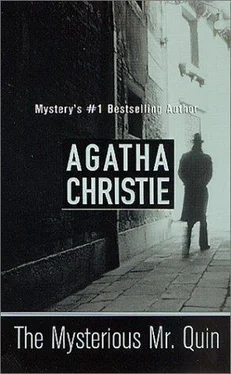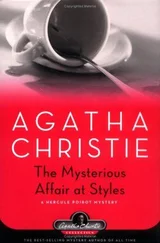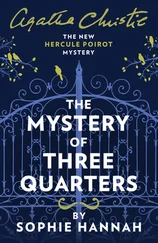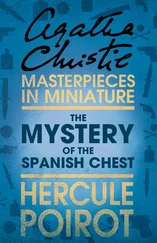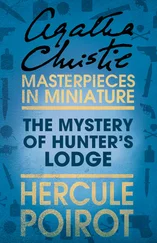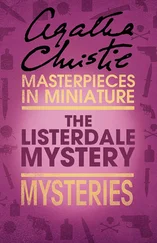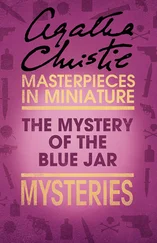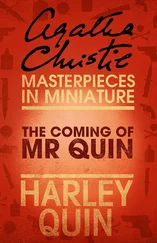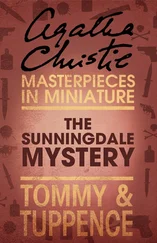Agatha Christie - The Mysterious Mr. Quin
Здесь есть возможность читать онлайн «Agatha Christie - The Mysterious Mr. Quin» — ознакомительный отрывок электронной книги совершенно бесплатно, а после прочтения отрывка купить полную версию. В некоторых случаях можно слушать аудио, скачать через торрент в формате fb2 и присутствует краткое содержание. Жанр: Классический детектив, на английском языке. Описание произведения, (предисловие) а так же отзывы посетителей доступны на портале библиотеки ЛибКат.
- Название:The Mysterious Mr. Quin
- Автор:
- Жанр:
- Год:неизвестен
- ISBN:нет данных
- Рейтинг книги:4 / 5. Голосов: 1
-
Избранное:Добавить в избранное
- Отзывы:
-
Ваша оценка:
- 80
- 1
- 2
- 3
- 4
- 5
The Mysterious Mr. Quin: краткое содержание, описание и аннотация
Предлагаем к чтению аннотацию, описание, краткое содержание или предисловие (зависит от того, что написал сам автор книги «The Mysterious Mr. Quin»). Если вы не нашли необходимую информацию о книге — напишите в комментариях, мы постараемся отыскать её.
The Mysterious Mr. Quin — читать онлайн ознакомительный отрывок
Ниже представлен текст книги, разбитый по страницам. Система сохранения места последней прочитанной страницы, позволяет с удобством читать онлайн бесплатно книгу «The Mysterious Mr. Quin», без необходимости каждый раз заново искать на чём Вы остановились. Поставьте закладку, и сможете в любой момент перейти на страницу, на которой закончили чтение.
Интервал:
Закладка:
He led her forward. She made a half gesture of recognition towards Miss Glen and then paused as the other made no response.
"I am so sorry," she murmured, "but surely I have met you somewhere, haven't I?"
"Over the footlights, perhaps," said Mr. Satterthwaite. "This is Miss Aspasia Glen, Lady Charnley."
"I am very pleased to meet you, Lady Charnley," said Aspasia Glen.
Her voice had suddenly a slight trans-Atlantic tinge to it. Mr. Satterthwaite was reminded of one of her various stage impersonations.
"Colonel Monckton you know," continued Mr. Satterthwaite, "and this is Mr. Bristow."
He saw a sudden faint tinge of colour in her cheeks.
"Mr. Bristow and I have met too," she said, and smiled a little.
"In a train."
"And Mr. Harley Quin."
He watched her closely, but this time there was no flicker of recognition. He set a chair for her, and then, seating himself, he cleared his throat and spoke a little nervously.
"I―this Is rather an unusual little gathering. It centres round this picture. I―I think that if we liked we could― clear things up."
"You are not going to hold a stance, Satterthwaite?" asked Colonel Monckton.
"You are very odd this evening."
"No," said Mr. Satterthwaite, "not exactly a seance. But my friend, Mr. Quin, believes, and I agree, that one can, by looking back over the past, see things as they were and not as they appeared to be."
"The past?" said Lady Charnley.
"I am speaking of your husband's suicide, Alix. I know it hurts you―――"
"No," said Alix Charnley," it doesn't hurt me. Nothing hurts me now."
Mr. Satterthwaite thought of Frank Bristow's words." She was not quite real you know. Shadowy, like one of those people who come out of hills in Gaelic fairy tales."
"Shadowy," he had called her. That described her exactly. A shadow, a reflection of something else. Where then was the real Alix, and his mind answered quickly―"In the past. Divided from us by fourteen years of time."
"My dear," he said, "you frighten me. You are like the Weeping Lady with the Silver Ewer."
Crash! The coffee cup on the table by Aspasia's elbow fell shattered to the floor. Mr. Satterthwaite waved aside her apologies. He thought―"We are getting nearer, we are getting nearer every minute―but nearer to what?"
"Let us take our minds back to that night fourteen years ago," he said." Lord Charnley killed himself. For what reason? No one knows."
Lady Charnley stirred slightly in her chair.
"Lady Charnley knows," said Frank Bristow abruptly.
"Nonsense," said Colonel Monckton, then stopped, frowning at her curiously.
She was looking across at the artist. It was as though he drew the words out of her. She spoke, nodding her head slowly, and her voice was like a snowflake, cold and soft. "Yes, you are quite right. I know. That is why as brig as I live I can never go back to Charnley. That is why when my boy Dick wants me to open the place up and live there again I tell him it can't be done."
"Will you tell us the reason, Lady Charnley?" said Mr. Quin.
She looked at him. Then, as though hypnotised, she spoke as quietly and naturally as a child.
"I will tell you if you like. Nothing seems to matter very much now. I found a letter among his papers and I destroyed it."
"What letter?" said Mr. Quin.
"The letter from the girl―from that poor child. She was the Merriam's nursery governess. He had―he had made love to her―yes, while he was engaged to me just before we were married. And she―she was going to have a child too. She wrote saying so, and that she was going to tell me about it. So, you see, he shot himself."
She looked round at them wearily and dreamily like a child who has repeated a lesson it knows too well.
Colonel Monckton blew his nose.
"My God," he said, "so that was it. Well, that explains things with a vengeance."
"Does it?" said Mr. Satterthwaite, "it doesn't explain one thing. It doesn't explain why Mr. Bristow painted that picture."
"What do you mean?"
Mr. Satterthwaite looked across at Mr. Quin as though for encouragement, and apparently got it, for he proceeded―
"Yes, I know I sound mad to all of you, but that picture is the focus of the whole thing. We are all here Tonight because, of that picture. That picture had to be painted― that is what I mean."
"You mean the uncanny influence of the Oak Parlour?" began Colonel Monckton.
"No," said Mr. Satterthwaite. "Not the Oak Parlour. The Terrace Room. That is it! The spirit of the dead man standing outside the window and looking in and seeing his own dead body on the floor."
"Which he couldn't have done," said the Colonel, "because the body was in the Oak Parlour."
"Supposing it wasn't," said Mr. Satterthwaite, "supposing it was exactly where Mr. Bristow saw it, saw it imaginatively, I mean, on the black and white flags in front of the window."
"You are talking nonsense," said Colonel Monckton, "if it was there we shouldn't have found it in the Oak Parlour."
"Not unless someone carried it there," said Mr. Satterthwaite. I
"And in that case how could we have seen Charnley going in at the door of the Oak Parlour?" inquired Colonel
Monckton.
"Well, you didn't see his face, did you?" asked Mr. Satterthwaite. "What I mean is, you saw a man going into the Oak Parlour in fancy dress, I suppose."
"Brocade things and a wig," said Monckton. "Just so, and you thought it was Lord Charnley because the girl called out to him as Lord Charnley."
"And because when we broke in a few minutes later there was only Lord Charnley there dead. You can't get away from that, Satterthwaite."
"No," said Mr. Satterthwaite, discouraged.
"No―unless there was a hiding-place of some kind."
"Weren't you saying something about there being a Priests hole in that room?" put in Frank Bristow.
"Oh!" cried Mr. Satterthwaite.
"Supposing―――?"
He waved a hand for silence and sheltered his forehead with his other hand and then spoke slowly and hesitatingly.
"I have got an idea―it may be just an idea, but I think it hangs together. Supposing someone shot lord Charnley. Shot him in the Terrace Room Then he―and another person―dragged the body into the Oak Parlour. They laid it down there with the pistol by its right hand. Now we go on to the next step. It must seem absolutely certain Lord Charnley has committed suicide. I think that could be done very easily. The man in his brocade and wig passes along the hall by the Oak Parlour door and someone, to make sure of things, calls out to him as Lord Charnley from the top of the stairs. He goes in and locks both doors and fires a shot into the woodwork. There were bullet holes already in that room if you remember, one more wouldn't be noticed. He then hides quietly in the secret chamber. The doors are broken open and people rush in. It seems certain that Lord Charnley has committed suicide. No other hypothesis is even entertained."
"Well, I think that is balderdash," said Colonel Monckton.
"You forget that Charnley had a motive right enough for suicide."
"A letter found afterwards," said Mr. Satterthwaite."
A lying cruel letter written by a very clever and unscrupulous little actress who meant one day to be Lady Charnley herself."
"You mean?"
"I mean the girl in league with Hugo Charnley," said Mr. Satterthwaite.
"You know, Monckton, everyone knows, that that man was a blackguard. He thought that he was certain to come into the title."
He turned sharply to Lady Charnley.
"What was the name of the girl who wrote that letter?"
"Monica Ford," said Lady Charnley.
"Was It Monica Ford, Monckton, who called out to Lord Charnley from the top of the stairs?"
"Yes, now you come to speak of it, I believe it was."
Читать дальшеИнтервал:
Закладка:
Похожие книги на «The Mysterious Mr. Quin»
Представляем Вашему вниманию похожие книги на «The Mysterious Mr. Quin» списком для выбора. Мы отобрали схожую по названию и смыслу литературу в надежде предоставить читателям больше вариантов отыскать новые, интересные, ещё непрочитанные произведения.
Обсуждение, отзывы о книге «The Mysterious Mr. Quin» и просто собственные мнения читателей. Оставьте ваши комментарии, напишите, что Вы думаете о произведении, его смысле или главных героях. Укажите что конкретно понравилось, а что нет, и почему Вы так считаете.
